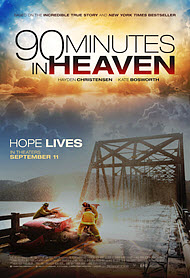90 Minutes in Heaven
 for intense accident and injury images.
for intense accident and injury images.
Reviewed by: Karen C. Flores
CONTRIBUTOR
| Moral Rating: | Better than Average, but Not Recommended |
| Moviemaking Quality: |
|
| Primary Audience: | Adults Teens Family |
| Genre: | Faith-based Drama Adapation |
| Length: | 2 hr. |
| Year of Release: | 2015 |
| USA Release: |
September 11, 2015 (wide) DVD: December 1, 2015 |





Horrific car accidents

Did Don Piper really die? No, Hebrews 9:27 states, “…it is appointed for man to die once…”
Death in the Bible
Is the Bible truly the final authority in all matters of faith? Answer
What did the Early Church believe about the authority of Scripture? Answer
Is “Sola Scriptura” a biblical or a man-made concept? Answer
Why does God allow innocent people to suffer? Answer
What about the issue of suffering? Doesn’t this prove that there is no God and that we are on our own? Answer
Does God feel our pain? Answer
ORIGIN OF BAD—How did bad things come about? Answer
Did God make the world the way it is now? What kind of world would you create? Answer





| Featuring |
Hayden Christensen … Don Piper Kate Bosworth … Eva Piper Hudson Meek … Chris Piper Bobby Batson … Joe Piper Elizabeth Hunter … Nicole Piper David Clyde Carr … Eva's Dad Catherine Carlen … Eva's Mom Dwight Yoakam Michael W. Smith … Cliff McArdle See all » |
| Director | Michael Polish — “The Astronaut Farmer” (2007) |
| Producer |
Family Christian Entertainment (FCE), sister company of Family Christian Stores Emmett/Furla Films Giving Films See all » |
| Distributor |
This film is based on a bestselling book called 90 Minutes in Heaven (7 million copies sold). While returning home from a minister’s conference, Baptist Pastor Don Piper (Hayden Christensen) gets hit by a semi-truck that swerved into his lane. He is believed to be dead by the rescue workers at the scene. After another pastor prays over him, Pastor Don comes alive. The remainder of the picture tells of Pastor Piper’s struggle for the will to live, because he suffers excruciating pain. In the meantime, the film also shows the difficulties his wife, Eva (Kate Bosworth), suffers, because all the burdens of taking care of the family rests on her shoulders. The story only spends about five minutes talking about Don’s supposed experience in heaven.
I found this film tedious to watch. I feel that the movie should be retitled “Nine Months in the Hospital.” It is quite laborious to sit through about 90 minutes of hospital footage. I watched Don Piper lying on a hospital bed moaning and groaning in pain. The nurse checks his vital signs and makes sure he uses his urinal. The doctors take him for more tests. He undergoes many surgeries due to his severely mangled body.
On the inspirational side, the movie shows that through the prayer support of his beloved wife, children, and friends, Don learns how to love and accept help from others. Throughout this film, he keeps questioning God, “Why did you keep me here to suffer?” Then, an old friend goes to the hospital and tells Don that he will have different churches pray for him. Don rejects the blessings of being alive, but his friend refuse to give up hope. It makes me think of the Biblical story of the paralyzed man whose four friends dig a hole in the roof and lower him in front of Jesus’ feet for him to be healed. Likewise, the faith of his friends pulls Don through the difficulties.
This film has no nudity, no sex, and the violence is mild. My caution is the scene where Don is hit by the semi-truck. The part where Pastor Piper is wheeled into the hospital is strong also. He is bloody and bruised. I found it hard to watch, but I was crying a lot in those sections. Parents would have to assess whether their young child can handle such scenes. My recommendation is ages 10 and up. Overall, I left the movie inspired with a sense of hope.
Violence: Mild / Profanity: None / Sex/Nudity: None
Did Don Piper really go to Heaven? Theologian and author Dr. John MacArthur says, “Scripture definitively says that people do not go to heaven and come back: ‘Who has ascended to heaven and come down?’ (Proverbs 30:4). Answer: ‘No one has ascended into heaven except he who descended from heaven, the Son of Man’ (John 3:13, emphasis added). All the accounts of heaven in Scripture are VISIONS, not journeys taken by dead people. And even visions of heaven are very, very rare in Scripture. You can count them all on one hand.”
Four biblical authors had visions of heaven—not near-death experiences. Isaiah and Ezekiel (Old Testament prophets) and Paul and John (New Testament apostles) all had such visions. Two other biblical figures—Micaiah and Stephen—got glimpses of heaven, but what they saw is merely mentioned, not described (2 Chronicles 18:18; Acts 7:55).
Only three of these men later wrote about what they saw—and the details they gave were comparatively sparse (Isaiah 6:1–4; Ezekiel 1, 10; Revelation 4–6). All of them focused properly on God’s glory. They also mentioned their own fear and shame in the presence of such glory. They had nothing to say about the mundane features that are so prominent in modern tales about heaven (things like picnics, games, juvenile attractions, familiar faces, odd conversations, and so on). Paul gave no actual description of heaven but simply said what he saw would be unlawful to utter. In short, the biblical descriptions of heaven could hardly be any more different from today’s fanciful stories about heaven.
Lazarus of Bethany fell ill and died, and his body lay decaying in a tomb for four days until Jesus raised him (John 11:17). A whole chapter in John’s Gospel is devoted to the story of how Jesus brought him back from the dead. But there’s not a hint or a whisper anywhere in Scripture about what happened to Lazarus’s soul in that four-day interim. The same thing is true of every person in Scripture who was ever brought back from the dead, beginning with the widow’s son whom Elijah raised in 1 Kings 17:17–24 and culminating with Eutychus, who was healed by Paul in Acts 20:9–12. Not one biblical person ever gave any recorded account of his or her postmortem experience in the realm of departed souls.
The New Testament adds much to our understanding of heaven (and hell), but we are still not permitted to add our own subjective ideas and experience-based conclusions to what God has specifically revealed through His inerrant Word. Indeed, we are forbidden in all spiritual matters to go beyond what is written (1 Corinthians 4:6).
Those who demand to know more than Scripture tells us about heaven are sinning: “The secret things belong to the Lord our God, but those things which are revealed belong to us and to our children forever” (Deuteronomy 29:29). The limits of our curiosity are thus established by the boundary of biblical revelation. …What God has revealed in Scripture is the only legitimate place to get a clear understanding of the heavenly kingdom. God’s written Word does in fact give us a remarkably full and clear picture of heaven and the spiritual realm. But the Bible still leaves many questions unanswered.
We need to accept the boundaries God Himself has put on what He has revealed.
See the following helpful articles…
Article: Christian Research Institute, “From Heaven to Earth with a Story that Sells” by Warren Nozaki
Tim Challies book review: 90 Minutes in Heaven: A True Story of Death and Life
“Spiritual Shipwreck of the Word-Faith Movement” by Justin Peters (discusses Don Piper)
See list of Relevant Issues—questions-and-answers.


Moral rating: Good / Moviemaking quality: 3½
Moral rating: Excellent! / Moviemaking quality: 3½
Moral rating: Good / Moviemaking quality: 1½
PLEASE share your observations and insights to be posted here.


However, in contrast, Hayden Christenson’s performance as Pastor Don Piper is good, and the ending is memorable, with Don talking to a youth who has suffered a similar injury. On a moviemaking quality standpoint, I felt this was better than “War Room,” because it actually has some elements of hardship that remain, and the happily-ever-after is connected to the suffering, rather than the final absence of suffering. Don receives a calling from Christ through his suffering, but he has to endure the suffering to get it.See all »
My Ratings: Moral rating: Excellent! / Moviemaking quality: 4